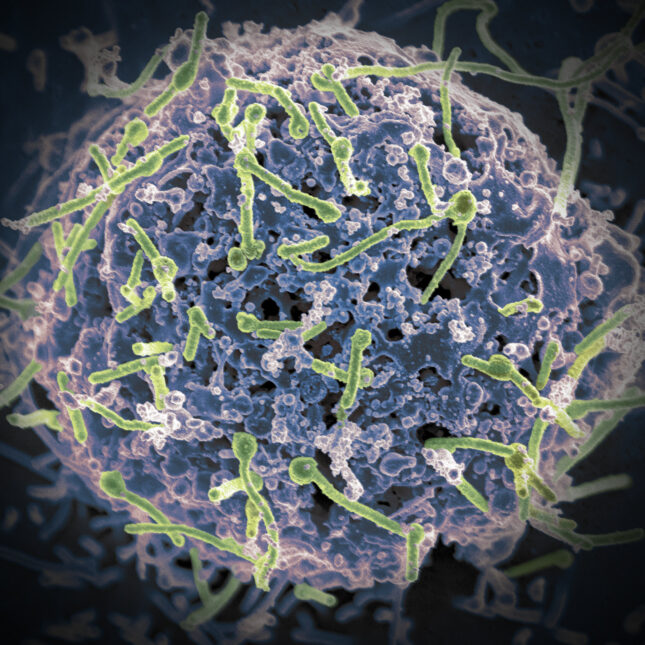
Want to stay on top of health news? Sign up to get our Morning Rounds newsletter in your inbox.
I’m working on a playlist for an upcoming road trip. Got song suggestions for driving across vast landscapes? Email me: [email protected]
I’ve already got the latest single from my favorite band, Wild Pink, and lots of the War on Drugs (no relation to the war on opioids and recovery).
Speaking of, don’t miss my colleague Lev Facher’s story on Purdue Pharma’s controversial opioid overdose medication approval.
Another Ebola outbreak?
From STAT’s Helen Branswell: The Democratic Republic of the Congo may have another Ebola outbreak on its hands. The World Health Organization told STAT it has been informed of seven suspected cases in Bas-Uélé, in a remote and difficult-to-access province in north-central DRC, along the border with the Central African Republic. Of the seven, five have died. If this is confirmed to be Ebola, it would be the country’s 16th known outbreak and the 10th in the past decade.
Samples from three of the suspect cases tested negative for Zaire ebolavirus — the Ebola type that has caused most of DRC’s outbreaks. But the samples were apparently of poor quality and the National Institute of Biomedical Research in Kinshasa recommended additional specimens be collected and submitted. Testing also needs to be done to rule out other Ebola species and Marburg, a related virus that causes similar disease. DRC was the site of the first confirmed Ebola outbreak, in 1976, and has recorded more outbreaks than any other country.
More deaths are because of chronic disease
A National Center for Health Statistics report brings us some good news: Overall, deaths in the U.S. in 2023 were 6.1% lower than in 2022.
However, while Covid deaths dropped 68.9%, moving from the fourth-leading cause of death to the 10th (it still caused or contributed to 76,446 deaths last year), chronic disease deaths are ticking up: Deaths from stroke, chronic lower respiratory diseases, Alzheimer’s, diabetes, kidney disease, and liver diseases all increased last year.
Experts attributed this to a failure of primary care and chronic disease management. In the absence of a better system for delivering care, said Asaf Bitton, a primary care physician and executive director of Ariadne Labs, “we’re going to see the rebound of these nasty chronic conditions take their horrible toll, in an inequitable way. And we’re going to basically leave a lot of preventable mortality on the table.”
Read more, including how drugs and alcohol contributed to the third-leading cause of death, from STAT’s Liz Cooney.
Disadvantaged communities are exposed to more air pollution
Breathing in air pollution, including particulate matter, nitrogen dioxide, and ozone, can be bad for your health. But maps of air pollution are typically based on low-resolution data sources, like annual measurements or sensors that are few and far between. But a new study in Science Advances compiles data from several sources, including Google Earth, to model air pollution on a daily, block-by-neighborhood-block basis in California.
This high-resolution model allowed researchers to see that over the span of 2012-2019, though air pollution overall decreased, disadvantaged communities experienced higher levels of air pollution. Manufacturing plants, major roadways, and industrial facilities are more likely to be located near disadvantaged communities, which also have fewer parks and green spaces to trap pollutants.
For more on how where you live affects your health, check out STAT reporter Angus Chen’s recent story on how your neighborhood affects the biology of tumors.
Susannah’s cure holds out hope for n-of-1 ultra-rare diseases
Courtesy Luke Rosen
It’s hard to believe that your child having 30 seizures a week would be good news…unless she previously was having over 100 seizures a day.
Susannah Rosen, now 10 years old, has rare mutations in a gene called KIF1A, which is associated with intellectual disability, spastic limbs, and atrophy of nerve cells in the brain and eye. When she was 8, she received an individualized treatment that limited her seizures and falls, let her walk more often, and nearly eliminated tremors that previously made it hard for her to hold a fork or crayon.
That treatment was from a nonprofit called n-Lorem, an organization founded by former Ionis CEO Stanley Crooke. Using the technology behind Ionis’ commercial gene therapy Spinraza, a treatment for spinal muscular atrophy, Crooke is hoping to craft bespoke treatments for patients with ultra-rare diseases for free. So far, the organization has treated 10 patients. But how can these treatments possibly scale to all the patients living with devastating ultra-rare diseases? Read more in Jonathan Wosen’s story.
FTC shuts down genital-picture-based AI app
Earlier this year, STAT’s Lizzy Lawrence brought us news of a troubling pair of apps: HeHealth and Calmara, meant to identify sexually transmitted diseases from photos of users’ (in the case of HeHealth) or users’ partners’ genitals (in the case of Calmara). However, there was little proof the tool actually worked, lulling users into a false sense of security, or — as it may be — panic.
The app was permitted because it fell into an FDA gray zone, claiming to be a “lifestyle product” rather than a diagnostic medical device.
However, the FTC got to the apps before the FDA did. In June, the FTC began investigating the company’s exaggerated marketing, and in July it got the company to agree to shut down the apps and delete personal user information, saying that the company didn’t have enough evidence for its health-based claims.
Read about the penis-scanning AI company here, and more from Lizzy on the apps’ shutdown here.
How ecstasy (might) become a therapeutic drug
By Sunday, the FDA is expected to rule on whether MDMA, in conjunction with therapy, can be used to treat post-traumatic stress disorder. The road to approving the psychedelic drug has been a long one, fraught by questions and setbacks.
In June, a FDA advisory panel voted against recommending the agency approve the drug, doubting the strength of the studies showing it worked. Onlookers are concerned that the trial data didn’t properly reflect participants’ thoughts of suicide. Former employees of Lykos, the company seeking the FDA approval, said the hype around the drug sometimes interfered with the scientific process in its drug trials.
“If we get an approval, there’s still work to be done. If the FDA delays its decision, there’s work to be done. Regardless of the outcome, we’ll still continue forward,” Blair Clark-Schoeb, Lykos’ chief communications officer, told STAT this week.
Ahead of the decision, STAT’s Olivia Goldhill and Meghana Keshavan answer common questions about how MDMA works, its risks, and the arguments for and against its approval.
What we’re reading
- Doctors can now save very premature babies. Most hospitals don’t try, Wall Street Journal
- No hands, please: We’re Dutch, New York Times
- How experiencing famine in the womb may shape people’s health as adults, STAT
- How an anti-abortion doctor joined Texas’ maternal mortality committee, Texas Tribune
- Africa’s new force in genomics, Science
- Medicine needs fiction, especially now, STAT
To submit a correction request, please visit our Contact Us page.









